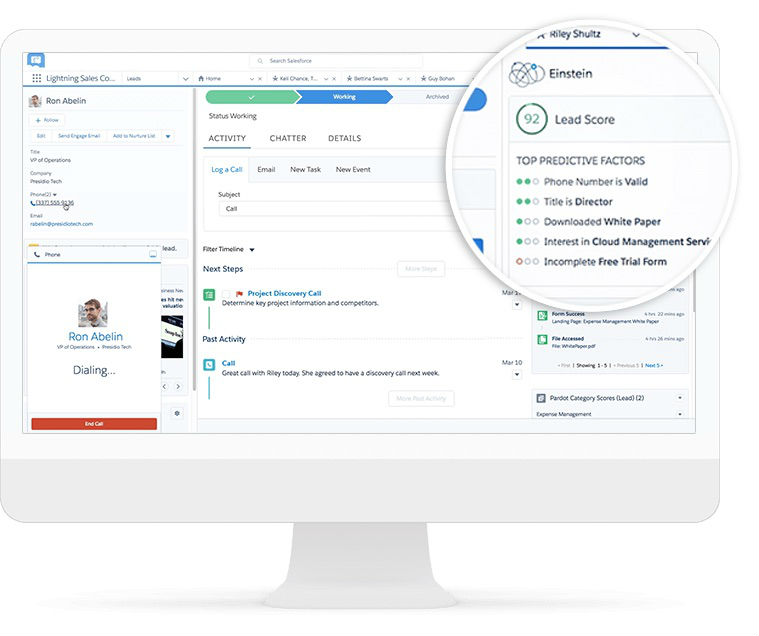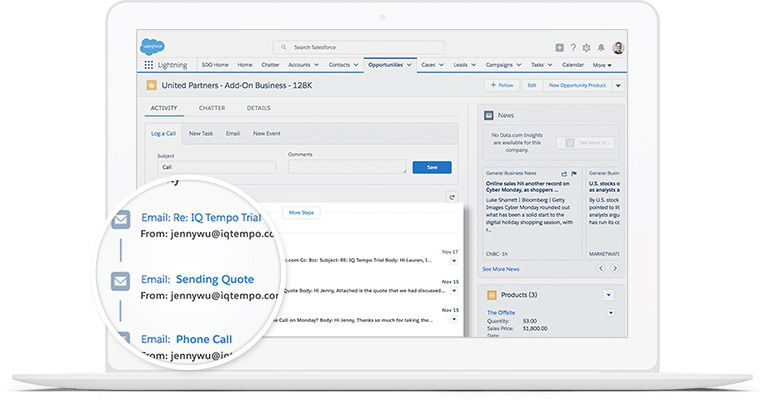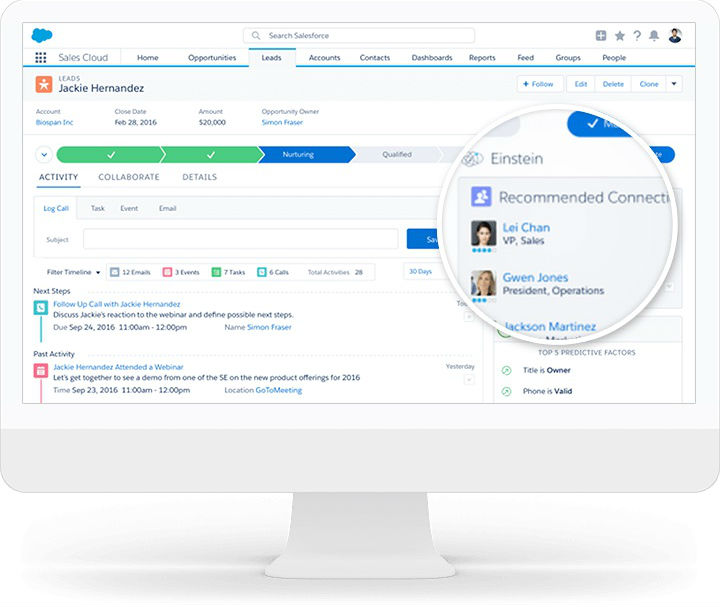
Get your FREE 30-day trial.
Start by selecting a product:
Customer relationships are key to any business’ growth, so it makes sense for you to manage them as efficiently and effectively as possible. Here's how customer relationship management (CRM) technology can help you be more connected to customers, improve business performance and grow your company:
So, you've spent time and marketing resources attracting and generating new leads, but now what? Are they getting passed on to your sales team? If they are, do your reps know which opportunities are the hottest? Without a CRM system, 79% of all marketing leads are never converted to sales.
When you're a small business, growing fast and time is of the essence. Make the most of your marketing tools – email, social, marketing automation, etc. by connecting them to a CRM platform. Both sales and marketing will have a complete view of leads and prospects, so they can create and target engaging communications to turn prospects into customers and reach key decision makers faster.
CRM applications have a proven track record of increasing:
Lead volume by up to 27%
Campaign deployment by up to 28%
Lead conversion by up to 30%
Marketing ROI by 25%
Average percentage improvements reported by Salesforce customers
Source: Salesforce Relationship Survey conducted 2014–2016 among 10,500+ customers randomly selected. Response sizes per question vary.
By developing a deeper understanding of a customer’s business, you’ll be able to build a strong relationship founded on trust and mutual success. A CRM system can help a business:
Explore customers’ challenges: Find out what matters to customers – their goals, challenges and preferences – and make sure you have a follow-up action plan. By recording these notes in your CRM system, you can easily pick up the conversation where you left off.
Engage with relevancy: After you understand a customer's business challenges and goals, you can more accurately recommend appropriate products, special promotions or content. With CRM, you'll also know what they've purchased and how they're using your products or services, so you can provide the most relevant content and information.
Scale your 1-to-1 relationships: As a small business, offering personal experiences is key. But as you grow, it becomes more challenging to remember the details of every single customer and know when to follow them up. A CRM platform can capture a complete view of the customer, host email templates, set up task reminders and enable phone calls to make the follow up process much faster and easier.
New customers are a key ingredient of continued growth, but they’re not easy or cheap to come by. It makes good business sense to offset new customer acquisition costs by also selling to your existing customer base, where the probability of a sale is much higher, thanks to the trust you’ve already earned. One of the advantages of CRM is that it provides greater visibility of the upsell, cross-sell and renewal opportunities across the customer portfolio.
A CRM system can help you reduce the cost of sales by:
Improving sales efficiency: CRM automatically prioritises leads and opportunities that are highly likely to convert to a sale based on customer interactions with your company.

Boosting sales effectiveness: Know which customers are engaged and when is the right time to reach out for optimal response.

Increasing upsell and cross-sell opportunities: With CRM, you can see all of the opportunities already in progress that are a good fit for add-on deals.
Uncovering referral business: Instead of paying for dead-end leads or wasting time cold calling, find untapped opportunities in existing relationships.

Reducing time to close: When you have a 360-degree view of your customer, you can instantly align your team on the next steps to close a deal.
When businesses adopt the right technology, manual operations like hunting for contact information or entering data can be automated or eliminated from customer-related processes. Automation across sales, service and marketing will free up your employees so they can spend more time talking to prospective customers and strengthening relationships with existing ones, ultimately moving the needle for your business.
Even the best product is only as good as the service that comes with it – both before and after the sale. You don’t want to hit up your prospects with multiple marketing promotions that will annoy or scare them away. You also don’t want to drop the ball after a sale, wasting all that time and effort that went into winning a valuable customer.
When your entire team has immediate access to a customer’s complete history, everyone can quickly and easily provide personalised messages and solutions. Meanwhile, smoother interactions build trust and encourage repeat business.
A CRM results in a:
22% decrease in support costs
26% increase in customer retention
31% faster case resolution
35% increase in customer satisfaction
Average percentage improvements reported by Salesforce customers
Source: Salesforce Relationship Survey conducted 2014–2016 among 10,500+ customers randomly selected. Response sizes per question vary.
By having complete visibility across all of your customer relationships, teams can proactively address accounts that are at-risk and present satisfied customers with new opportunities at just the right moment. With transparency into customer histories, active campaigns or open cases, you can provide more satisfying purchases and service experiences that improve customer retention.
If you invest your time wisely now, strong customer relationships will pay dividends for years to come.
So, you get what CRM does and the benefits of having a CRM system, but you’re still not 100% sure it’s essential for your business? Keep reading ‘CRM 101: Part 3 – How to tell if your business needs a CRM system’, or find out what makes Salesforce the world’s number one CRM.